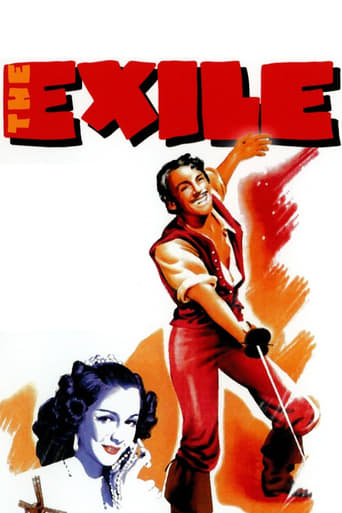edwagreen
1660 and King Charles has been removed from the throne by the tyrant Cromwell,vi who never appears as a character in the film. The closest is Henry Danielle, in his usual villainous demeanor. His voice sounded like Richard Burton.The film gets bogged down with Douglas Fairbanks finding refuge in the house of a flower girl and farmer, with true love resulting.There was a guy, an actor pretending to be king, who really confuses things at certain points.The ending reminded me of "The Student Prince," where lovers must part for the king to pursue his responsibility.
bkoganbing
When Douglas Fairbanks, Jr. started his career in silent screen he did not go for the swashbuckling roles that his famous father did. My guess is he wanted to be judged on his own as a player. In fact it was his mother who when Fairbanks, Sr. was slow with the child support who got him into film in the first place, hoping to capitalize on the name. Later as he got older and was established in his own right, Fairbanks made claim to the legacy of his father in such films as The Exile.In fact Fairbanks both wrote the screenplay and produced this film and got European director Max Ophuls for the piloting. He plays a most famous exile, Charles Stuart, Charles II of Great Britain who is exiled in the Netherlands and poised to reclaim his own in 1660.The story is based on a historical novel by British writer Cosmo Hamilton and it tells of that brief interregnum in British history between the sudden death of Oliver Cromwell and the restoration of Charles II. Charles Stuart had narrowly escaped from his country after the Puritan takeover and was living in exile in somewhat humble circumstances wherever in Europe he could find shelter. In 1660 it was the Netherlands.Historians have debated long about the collapse of the military dictatorship of Lord Protector Oliver Cromwell. He had things pretty much his own way and when he died his son Richard wasn't up to the job he inherited. It was a close run thing that the United Kingdom did not break apart into civil war again at this time.By 1660 just about everybody except the most committed of Puritans felt that only a Stuart Restoration would keep the country united. But some of those most committed Puritans had a big vested interest in seeing that the Restoration did not occur. Therein lies the tale of this film.Douglas Fairbanks, Jr. is a perfect Charles Stuart, in fact he looks quite a bit like him. As in real life sharing his exile is Lord Clarendon who is played here by Nigel Bruce. When Charles reclaimed his throne, Lord Clarendon became his first minister. In the film as in life Clarendon was constantly reminding him of his duty and not to spend all his time on frivolity and chasing skirts. In real life after the action of this film, Charles got rid of Clarendon, but with a decent pension for loyalty and services rendered.As petitions come from various folks over in Great Britain to resume the monarchy, Charles plays coy all the time dodging Puritan agents. Several have come to the town where he's staying and Charles has a bit of sport with them by just pretending he's a penniless exile. He even takes a job as a laborer on Paula Corday's farm. He even falls for her as he did with MANY women.But a most cunning and ruthless Puritan in the person of Henry Daniell arrives to take over the hunt and kill the king before he can set sail back to his realm. This is one of Daniell's finest performances on screen, you can believe he's one cold and merciless killer and a true believer in the Puritan Revolution. Fairbanks and Daniell have a duel in a Dutch mill that's the equal of the one Errol Flynn and Basil Rathbone had in Robin Hood.As per her contract Maria Montez got top billing as a French countess who finds Charles Stuart as a farm hand and delivers a message of support from his cousin Louis XIV of France. Robert Coote has a very funny part as an unemployed actor who is passing himself off as Charles Stuart and who the Puritans nearly kill for such a good performance. Fairbanks uses Coote to his own end to further his deception, but steps in when Daniell's about to run him through.The Exile is one of Douglas Fairbanks, Jr.'s finest films and he really does the part in a way that would have made Dad proud.
princehal
This is probably the least appreciated of the series of masterpieces Max Ophüls made in his too-short stay in Hollywood. Superficially it is a fairly silly, light-hearted historical romp, and it is enjoyable enough on that level. But this only throws into sharper relief the expressive mastery of Ophüls' style - by the end of the movie a single elegant camera move is enough to turn the mood to high tragedy. This is sublime filmmaking.
larry41onEbay
In one of his BEST acting roles, Douglas Fairbanks, Jr.'s second stint as a movie producer--and his first as a writer--is an ambitious attempt to dramatize the tale of the restoration of Charles II to the throne of England. An avowed Anglophile, Fairbanks has a strong sense of the history of his adoptive land. (He was born in New York City.) Fortunately, the drama and excitement of the pursuit of Charles Stuart (Fairbanks) after his return from self-imposed exile in Holland by Oliver Cromwell's Puritans is lushly displayed by the producer-author-star's insistence on a deliberate, poetic pace for the story. Much of the film is concerned with Fairbanks' trysting with the luscious Croset--later Paula Corday--in her first starring role, as a Royalist who conceals the fugitive king on her estate. Despite a strong supporting cast and an interesting concept, the film is a forgotten charmer!



